Mary Anne Yarde's Blog: The Coffee Pot Book Club , page 55
November 18, 2020
Welcome to Day #4 of the blog tour for - Three Monkeys (DCI Jack Callum Mysteries Book 1) by Len Maynard #HistoricalFiction #Crime @len_maynard @Beatric09625662

Three Monkeys(DCI JACK CALLUM MYSTERIES BOOK 1)BY LEN MAYNARD

 OCTOBER 28TH – DECEMBER 30TH 2020AMAZON UK • AMAZON US
OCTOBER 28TH – DECEMBER 30TH 2020AMAZON UK • AMAZON USPublication Date: 22nd July 2020
Publisher: Sharpe Books
Page Length: 270 Pages
Genre: Historical Crime
1958.
A girl’s body is found in Hertfordshire.
Her eyes and mouth have been sewn shut. Candle wax has been poured into her ears to seal them.
DCI Jack Callum, policeman and dedicated family man, who cut his teeth walking the beat on the violent streets of London, before moving his family away from the city, to a safer, more restful life in the country, leads the investigation into this gruesome crime that shatters the peace of the sleepy English town.
Images of three monkeys are sent to the police to taunt them: see no evil, hear no evil, speak no evil. Something more sinister than a mere isolated murder seems to be going on as more victims come to light.
Who is doing this and why?
At the insistence of the first victim’s father, a local dignitary, officers from Scotland Yard are brought in to bring about a speedy conclusion to the case, side-lining Jack’s own investigation.
In a nail-biting climax, one of Jack’s daughters is snatched. Before she can become the next victim, Jack has to go against the orders of his superiors that have constantly hampered his investigation, and risk his own career in an attempted rescue at the killer’s own home.
ABOUT THE AUTHOR

Len Maynard was born in North London in 1953.
In 1978, a book of short ghost stories, written in collaboration with Michael Sims, was published by London publisher William Kimber. For the following forty years the pair wrote ten more collections of ghost stories before moving into novels in 2006, completing over thirty more books, including the successful Department 18 series of supernatural/crime crossover novels as well as several standalone novels and novellas in the supernatural and crime genres. Always a keen reader of crime novels, and with a passion for the social history of the twentieth century it was fairly inevitable that, when he decided to branch out and write under his own name, some kind of combination of these two interests would occur. The six DCI Jack Callum Mysteries were the result of several years of total immersion in the world he created for Jack Callum, his family, his friends (and enemies) and his work colleagues. He has also written a trilogy of adventure thrillers set in the Bahamas (also available from Sharpe Books) He is currently at work on the seventh book in the DCI Jack Callum series.
Today we are over on Candlelight Reading for an exclusive author interview!
Click HERE!
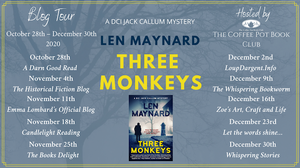

November 17, 2020
Have a sneak-peek between the covers of L J Trafford's fabulous book — How to Survive in Ancient Rome #AncientHistory #AncientRome @TraffordLj

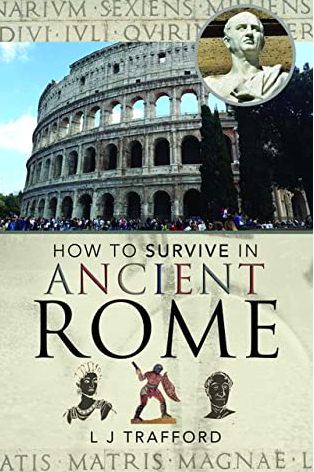
Publication Date: 11th November 2020Publisher: Pen and SwordPage Length: 147 pagesGenre: Historical Non-fictionBook Title: How to Survive in Ancient RomeAuthor: L J Trafford
Imagine you were transported back in time to Ancient Rome and you had to start a new life there. How would you fit in? Where would you live? What would you eat? How would you go to get your hair done? Who would you go to if you got ill, or if you were mugged in the street? All these questions, and many more, will be answered in this new how-to guide from time travellers. Part self-help guide, part survival guide, this lively and engaging book will help the reader deal with the many problems and new experiences that they will face, and also help them to thrive in their new environment.

So, you think you know Ancient Rome? After all you’ve seen Gladiator six times, you can use ‘Et tu Brute’ wittily in conversation, you can pepper political debate with tales of crazy Caligula making his horse a senator.
Except you don’t. Because Caesar never said ‘et tu Brute.’ Caligula never made his horse a senator, and Commodus definitely didn’t meet his end at the hands of a hunky gladiator with an attractively growly voice. Commodus was murdered by a wrestler named Narcissus, who’d been set the task by the empress, after the emperor had vomited up the poisoned beef she’d served him. Proving that fact, is indeed, stranger than fiction.
Ancient Rome is pretty strange place: clothes are washed in wee, babies are left in the rubbish and bad luck can be averted by wearing penis jewellery. But don’t panic! We are here to guide you through this strange new world. We shall provide you with practical advice that will save you accidentally insulting the locals, committing social fax pas of an embarrassing nature and help you avoid being sewn up in a sack with a snake, a dog and a cockerel.*
*genuine Roman punishment
 Amazon • Waterstones • Pen and Sword
Amazon • Waterstones • Pen and Sword
 L.J. Trafford studied Ancient History at university after which she worked as a Tour Guide in the William Wordsworth related tourism industry in the English Lake District. Left with a lifelong hatred of daffodils she headed for the bright lights of London where she began writing the Four Emperors Series of novels. This series, Palatine, Galba’s Men, Otho’s Regret and Vitellius’ Feast. covered the fall of Emperor Nero and the turbulent year that followed when four men competed to become emperor. Palatine received an Editor’s Choice mark from the Historical Novel Society. How to Survive in Ancient Rome is her first non-fiction book. Connect with L.J. Trafford:Facebook • Twitter
L.J. Trafford studied Ancient History at university after which she worked as a Tour Guide in the William Wordsworth related tourism industry in the English Lake District. Left with a lifelong hatred of daffodils she headed for the bright lights of London where she began writing the Four Emperors Series of novels. This series, Palatine, Galba’s Men, Otho’s Regret and Vitellius’ Feast. covered the fall of Emperor Nero and the turbulent year that followed when four men competed to become emperor. Palatine received an Editor’s Choice mark from the Historical Novel Society. How to Survive in Ancient Rome is her first non-fiction book. Connect with L.J. Trafford:Facebook • Twitter
Welcome to Day #7 of the blog tour for A Feigned Madness by Tonya Mitchell #HistoricalFiction #BlogTour #CoffeePotBookClub @tremmitchell @CaigJamie

A Feigned Madness
By Tonya Mitchell
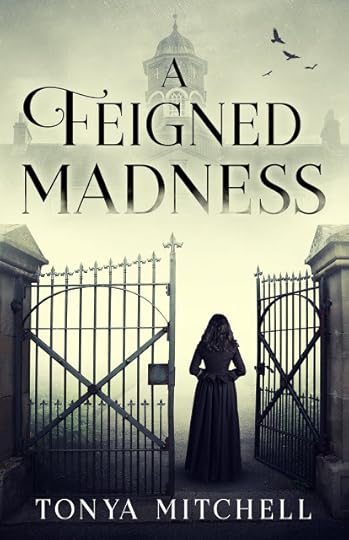
October 6th — December 8th 2020
Publication Date: 6th October 2020Publisher: Cynren Press
Print Length: 392 pages
Genre: Historical Fiction, Historical Thriller
The insane asylum on Blackwell’s Island is a human rat trap. It is easy to get in, but once there it is impossible to get out. —Nellie Bly
Elizabeth Cochrane has a secret.
She isn’t the madwoman with amnesia the doctors and inmates at Blackwell’s Asylum think she is.
In truth, she’s working undercover for the New York World. When the managing editor refuses to hire her because she’s a woman, Elizabeth strikes a deal: in exchange for a job, she’ll impersonate a lunatic to expose a local asylum’s abuses.
When she arrives at the asylum, Elizabeth realizes she must make a decision—is she there merely to bear witness, or to intervene on behalf of the abused inmates? Can she interfere without blowing her cover? As the superintendent of the asylum grows increasingly suspicious, Elizabeth knows her scheme—and her dream of becoming a journalist in New York—is in jeopardy.
A Feigned Madness is a meticulously researched, fictionalized account of the woman who would come to be known as daredevil reporter Nellie Bly. At a time of cutthroat journalism, when newspapers battled for readers at any cost, Bly emerged as one of the first to break through the gender barrier—a woman who would, through her daring exploits, forge a trail for women fighting for their place in the world.
Head over to The Whispering Bookworm for a sneak-peek between the covers of A Feigned Madness.
Click HERE!
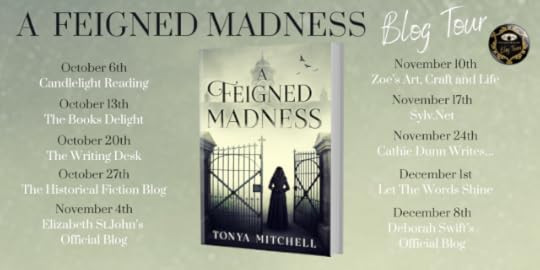
Welcome to Day #1 of the Blog Tour of — Betrayal #histfictioneers #Betrayal #HistoricalFiction #CoffeePotBookClub @HistFictioneers

Betrayal
By Judith Arnopp, Cryssa Bazos, Anna Belfrage, Derek Birks,Helen Hollick, Amy Maroney, Alison Morton, Charlene Newcomb, Tony Riches, Mercedes Rochelle, Elizabeth St. John, Annie Whitehead
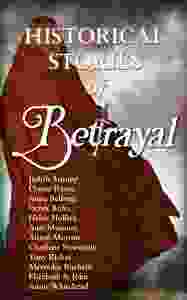

November 17th - January 19th
Publication Date: November 17, 2020
Publisher: Historical Fictioneers
Page Length: 486
Genre: Historical Fiction
Betrayal, treachery, treason, deceit, perfidy—all names for the calculated violation of trust. And it’s been rife since humans trod the earth. A promise broken A mission betrayed A lover’s desertion A parent’s deception An unwitting act of treason Betrayal by comrades Betrayal by friends Could you resist the forces of misplaced loyalty, power hunger, emotional blackmail, or plain greed? Is there ever redemption, or will the destruction visit future generations and even alter history? These questions are still with us today. Read twelve tales by twelve accomplished writers who explore these historical yet timeless challenges from post Roman Britain to the present day.
Our first stop of the tour is over on Deborah Swift's official blog where Mercedes Rochelle has written a fabulous guest post about Richard II.
Click HERE!

Welcome to Day #9 of the blog tour for The Sign of the Blood (A Dangerous Emperor, Book #1) by Laurence O'Bryan #BlogTour #HistFic @LPOBryan @LisaReadsBooks

THE SIGN OF THE BLOOD
(A DANGEROUS EMPEROR, BOOK #1)BY LAURENCE O'BRYAN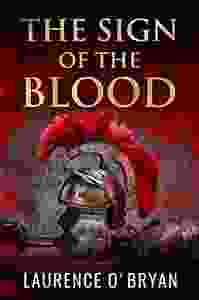

SEPTEMBER 22ND – NOVEMBER 24TH 2020
AMAZON
Publication Date: 22nd November 2018
Publisher: Ardua
Print Length: 469 Pages
Genre: Historical Fiction
The first Christian emperor faces ruthless enemies on his journey to power.
Cool mist settles over the legion advancing toward the Persian army. Constantine, the son of an emperor, the Roman officer leading the attack, tells his men to halt - something is wrong.
Before long, the battle rages. He frees a slave named Juliana. She is half Persian and half Roman. As they are pursued to Britannia over land and sea, he learns that she can see the future - his future.
It is 306A.D., long before Constantine the Great converted to Christianity and became the first Christian emperor.
To ensure he survives, he must eliminate his enemies. But who must die first? The priestess, Sybellina, who joined them in Rome and practices dark and seductive magic? Or the brutal legion commanders who surround his father? Or, as Juliana suspects, are those who want him dead even closer?
A gripping historical novel about Constantine’s bloody rise to power, the woman who helped him, and the real reason he supported a persecuted Christian minority, a decision which changed the world into the one we know.
Today we are stopping over on the Madwoman In The Attic for a book excerpt!
Click HERE!

November 16, 2020
Welcome to Day #3 of the blog tour for Lady Estrid: A Novel of Eleventh Century Denmark by M J Porter #HistoricalFiction #BlogTour @coloursofunison @JudithArnopp

LADY ESTRID: A NOVEL OF ELEVENTH CENTURY DENMARKBY M J PORTER
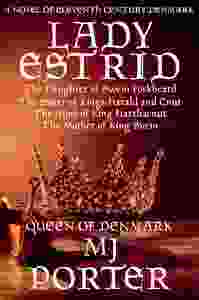

November 2nd – January 4th
Amazon UK • Amazon US
Publication Date: 29th October 2020
Publisher: Independently Published
Page Length:
Genre: Historical Fiction
Daughter, Sister, Duchess, Aunt. Queen.
United by blood and marriage. Divided by seas. Torn apart by ambition.
Lady Estrid Sweinsdottir has returned from Kiev, her first husband dead after only a few months of marriage. Her future will be decided by her father, King Swein of Denmark, or will it?
A member of the ruling House of Gorm, Estrid might not be eligible to rule, as her older two brothers, but her worth is in more than her ability to marry and provide heirs for a husband, for her loyalty is beyond question.
With a family as divided and powerful as hers, stretching from England to Norway to the land of the Svear, she must do all she can to ensure Denmark remains under the control of her father’s descendants, no matter the raging seas and boiling ambition that threatens to imperil all.
Head over to Judith Arnopp's Official Blog where you can have a sneak-peek between the covers of Lady Estrid.
Click HERE!

November 12, 2020
#BookReview — Fire and Ash (Gifts of the Gods, Book 3) by Thomas J Berry #AncientGreece #HistoricalFiction @TBerryAuthor


Book Title: Fire and Ash
Series: Gifts of the Gods, Book 3
Author: Thomas J Berry
Publication Date: 10th October 2020
Publisher: BookLocker
Page Length: 450 Pages
Genre: Historical Fiction
Five men and women in Ancient Greece are set on a dangerous journey of self-discovery during the bitter conflict of the Peloponnesian War.
While mighty Athens struggles to rebuild after a devastating campaign abroad, the feared warriors of Sparta prepare to deliver the final blow in a decades long war. No one is safe anymore as the conflict shifts across the Aegean to the shores of wealthy Persia. Old colonies, once loyal to Athens, are eager to rebel and the Great King is willing to pay anything to regain his control over them. These coastal plains set the stage for massive battles and heartbreaking defeats. This time there will be only one true victor.
The news coming out of Sicily ripples across the cities of Ancient Greece like a thunderbolt and it is left to the poor and desperate to pick up the pieces of their shattered lives. One young mother is suddenly faced with a horrible tragedy and struggles against all odds to make a new life for her family. An eager boy looking for adventure enlists in the new Athenian ranks but finds life on campaign a lot more than he bargained for. A Spartan officer in the twilight of his years struggles to adapt to a young man's army and an exiled Athenian strives to earn his way back into the graces of his beloved city. The harem girls in a Persian court meet a handsome foreigner and one risks everything for a chance at love.
As the conflict between Athens and Sparta builds to a final showdown, five men and women struggle to come to terms with their changing world. What will they find in the ashes when peace finally comes?

“… Allies can be as much a hindrance sometimes as the real enemy…”
Peace was always going to be a fragile thing, and war was forever on the horizon. Unfortunately for the Athenians and the Spartans alike, allies can no longer be relied upon. As this war takes on a new desperate edge, their allies must decide who to stand with. Everything depends upon them making the right decision…
Once again Thomas J Berry has presented his readers with an enthralling story of war, loyalty, loss and love. Fire and Ash: Gifts of the Gods, Book 3 is everything I expected it to be, and then some.
The bitter conflict of the Peloponnesian War between Athens and Sparta has been brought gloriously back to life between the pages of Berry’s remarkable series, Gift of the Gods. Having enjoyed the first two books immensely, I could not wait to read the final instalment in what can only be described as one of the most beguiling series set in the Ancient World that I have ever read. Thankfully, Fire and Ash did not disappoint. With battles aplenty, scheming politicians, and the desperate domestic struggles of those innocent citizens caught in the crossfire between two warring nations, Berry has penned a book that is next to impossible to put down.
The careful use of foreshadowing at the beginning of this novel hints at the sinister end that is to come. At the start of this book, there is a fire in a residential community, a fire that cannot be contained nor extinguished, instead friends and neighbours watch helplessly as they stand back and wait for the fire to burn itself out and leave only ash in its wake. The same could be said for the useless peace treaties and the ongoing military campaigns. This war was a profoundly destructive fire, and nothing could stop it from reaching its dramatic conclusion.
Although this book focuses primarily on the war, Berry does remind his readers that there is more to life than battles, victory and defeat. And although the war is at the forefront of everybody’s minds, one still has to go to work and to the market. There are moments of grief, but also moments of joy—be that a gallop along the clifftops, or starting a new life with a loving husband. Life, despite the war, despite the hardship, carries on.
This book is in no way a celebration of war. There are, however, warriors that demonstrate their worth on the battlefield, and military commanders that can snatch victory at the most opportune of moments. And although some characters such as Alcibiades seek eternal glory, there are others who long to go home and live a peaceful, productive life away from the bloodshed and the battles. Fire and Ash certainly does not glorify war, and while this book argues that both sides had a justifiable claim to continue the war, the loss of life, the cruelty and the disrespect that was shown to the dead brings the realities of such a long and protracted campaign to the forefront of the readers’ mind. And as the death toll adds up, Berry reminds his readers of the ephemeral duration of man and what a waste it is when the young are butchered on the battlefield so very needlessly. But the one thing that I found endlessly fascinating was that not once did I choose a side in which to root for. There are characters that I liked and despised in both camps, which I thought made this story incredibly realistic.
By telling this story from both sides, Berry has given his readers an intimate insight to not only the two very opposing camps but also how very differently they viewed the world. Even though they were neighbours, the two kingdoms could not have been more dissimilar. Athens is said to be the birthplace of democracy. They were also a trading nation, which was rich in culture and art, whereas Sparta bred a society of warriors, who favoured farming and conquering to the more sophisticated economic activity of its neighbour. These fundamental differences have been depicted with great skill and diligence throughout this series.
The Spartans were mighty warriors who were conditioned to withstand hardship and to keep on fighting, to the very death if necessary. This cultivated determination is demonstrated most admirably in Berry’s depiction of Aleki. Although considered, even by himself, past his prime, Aleki is still a proud warrior who believes, with every fibre of his being, in the Spartan way of life. As foreign as it may seem to his country’s enemies, Aleki believes that how his nation is governed is straightforward and easy to understand. However, this does not make him blinkered to Sparta’s weaknesses, nor does it make him complacent. He understands the risks of fighting the Athenians at sea, and he accepts the limitations of his own warrior class. Aleki really intrigued me throughout the novel because he is wise and he stands up for what he believes in, even if that belief has come from a life of conditioning.
If a man’s mortal body is destined to die, then the only way to guarantee immortality is by either saying something profound or doing something extraordinary. And so enters, Alcibiades. For those who know their Greek history, his name will be one that is instantly recognisable. Statesman, orator, general, spy and lover—Alcibiades achieved what he set out to achieve. His name is remembered, but not always for the right reasons. His ability to make enemies is as legendary as his skill as a military strategist. Here is a man who was forced to flee from Athens, and for some reason decided Sparta would be a great place to seek asylum. And fools that they were, the Spartans allowed him to stay. So it must have come as somewhat of a surprise when Alcibiades turned his back on those who had warily welcomed him into their fold and fought once more for the country of his birth. But even his cautious welcome from his Athenian brothers did not last for long! Alcibiades was a man who sought acclaim—he wanted fame, glory, and riches. Whatever your thoughts on Alcibiades might be, I thought Berry’s portrayal was remarkably realistic and as historically accurate as it could be in the telling. And at the end of the day, Alcibiades did achieve what he set out to—his name and his deeds are forever immortalised.
Unlike many books set in the Ancient World, Berry has presented his readers with two very strong female characters. Lissy, a former helot, has made a life for herself in Athens, but the war puts everything and everyone she loves at risk. Seeing things through the eyes of an ordinary citizen helps the reader to understand the broader implications of this war and what it meant for them. I thought Lissy’s depiction was fabulous. The other heroine in this novel is Timandra, and it is through her depiction that we come to see Alcibiades for who he really was. Thus, the conclusion of these women to this story means the reader has an all-encompassing view of the era and the war.
Although this book does stand firmly on its own two feet, I would suggest starting with Book 1, so you can get an overview of the Peloponnesian War from beginning to end.
Fire and Ash: Gifts of the Gods, Book 3 by Thomas J Berry is immensely readable. You do not have to know anything about the Peloponnesian War to enjoy it, for everything is explained and explored in explicit detail. The Gifts of the Gods is a fabulous trilogy in which you can travel to another time and another place, all from the comfort of your favourite comfy chair!
I Highly Recommend.
Review by Mary Anne Yarde.The Coffee Pot Book Club.
 Amazon UK • Amazon US • Amazon CA • Amazon AU • BookLocker
Amazon UK • Amazon US • Amazon CA • Amazon AU • BookLocker
 Thomas Berry received a Bachelor of Arts degree in Philosophy from St. Bonaventure University. He takes pleasure in extensively researching both historical fiction and non-fiction stories. In his spare time, he enjoys long distance running and has completed several marathons. He currently lives with his wife and children in New Jersey. You can learn more about Thomas and his historical novels at his website, www.thomas-berry.com.
Thomas Berry received a Bachelor of Arts degree in Philosophy from St. Bonaventure University. He takes pleasure in extensively researching both historical fiction and non-fiction stories. In his spare time, he enjoys long distance running and has completed several marathons. He currently lives with his wife and children in New Jersey. You can learn more about Thomas and his historical novels at his website, www.thomas-berry.com.Twitter • Instagram • Goodreads

Join me in Conversation with #HistoricalFiction author, Peter Tonkin #AncientGreece @SharpeBooks @petertonkin50

A Conversation with Peter Tonkin

Mary Anne: A huge congratulations on your fabulous series, The Trojan Murders. Could you tell us a little about your books and how you came to write them?
Peter Tonkin: I have loved the classical eras ever since studying Latin at prep school as a youngster. Sadly, I didn’t study Greek but the Romans were so fascinated with Greek history, myth and legend that I soon became familiar with it and that led pretty quickly to The Iliad and The Odyssey. Although my father and his father were both officers in the RAF, they were also both closely attached to the sea (the Tonkins hail from the Isles of Scilly) and I was also fascinated with everything from rivers to oceans from a very early age. This was particularly so because as our family followed my father from posting to posting we nevertheless spent summers on the Isle of Cumbrae in the Firth of Clyde; and later with my mother’s family on the north and west coasts of Ireland. So, over the years I came to know the North Sea, the Atlantic, the Mediterranean (West Basin and East) and what used to be called the Persian Gulf. Therefore it was not much of a leap for me to identify with Odysseus above all the other heroes. It seemed natural to me to place Odysseus at the centre of a series of stories so I could give them the nautical setting by which I was most excited myself.
Mary Anne: I read the Iliad, which is traditionally attributed to Homer, back when I was a teenager, and I have been fascinated by the Trojan wars ever since. What was it about this time and this era that inspired you to write this series?
Peter Tonkin: It was all set in what Keats famously refers to as ‘the realms of gold’. The Golden Age, the Heroic Age. I am fascinated by the simple heroism of the men and women described in Homer’s works and those other contemporary ones associated with his stories and characters. I know I am by no means alone in this but it seemed to me that I could bring a fresh voice to the narrative by presenting them as men and women driven by emotions and desires we can understand rather than by the whims of Gods and Goddesses. This is particularly true in Vengeance at Aulis, for the story of Agamemnon’s sacrifice of his daughter Iphigenia to appease the angry Goddess Artemis is one where the Gods seem particularly deeply entangled in the plot, though to be fair it is Euripides rather than Homer who tells the story most clearly.
Mary Anne: The Trojan Murders has been described most elegantly as a series where “Homer meets Holmes.” Why did you choose to give this series an Arthur Conan Doyle twist to it?
Peter Tonkin: It was Odysseus who fascinated me, as I have said. He stands not simply as a character but also as a symbol at the centre of much narrative theory. Eric Auerbach famously begins his analytical study of narrative Mimesis by comparing the section of the Odyssey telling of Odysseus’ scar with the section of the Bible where Abraham is directed by God to sacrifice Isaac – a narrative with striking parallels to the story of Iphigenia and Vengeance at Aulis. Furthermore, Keld Zeruneith in The Wooden Horse, an analytical history of early Western thought, uses Odysseus to symbolise the first great leap forward – from observation to analysis. It is Odysseus, after all who defeats the Trojans not by outfighting them but by out-thinking them. That observation was more than enough to establish Odysseus in my mind as the Sherlock Holmes of his age, with the ability to solve problems (particularly murderous ones) in ways that seem almost magical to Achilles, Agamemnon and the other heroes with whom he is surrounded.
Mary Anne: What were the challenges you faced in researching this period of history and were there any unexpected surprises?
Peter Tonkin: Mycenaean Greece shares some aspects with the Age of Dinosaurs. We know it existed, we know some elements about it which we are fairly certain are factual (though these seem to change on a fairly regular basis as our knowledge expands). We know it ended abruptly – almost overnight in historical terms – and was followed by a ‘Dark Age’ comparable to that which followed the collapse of the Western Roman Empire. At its height, before 1300 BCE, it covered the Mediterranean basin, linking with the Hittites and other similar societies to the East stretching beyond Babylon and with the Egyptians to the south, but apart from those in Egypt, contemporary records are scanty. The contemporary Greek writing, Linear B was not translated until the 1950’s and seems to have been largely used for recording the contents of warehouses. It seems that Agamemnon and his contemporaries had yet to use writing for social communication despite what Euripides says - and they had not yet invented money. The metal which defined the age was bronze – though where the rare tin came from that made their plentiful copper hard, is still a matter of some debate: anywhere from Cornwall to Afghanistan apparently. The Trojan War took place right towards the end of the Mycenaean Bronze Age and may even have been instrumental in its destruction (with the help of the mysterious ‘Sea Peoples’ who invaded from the north and west) because of the fatal damage done to the Greek kingdoms that were involved in such a long and costly campaign. The collapse occurred around 1200 BCE, a good 400 years before Homer began to tell the stories of Troy. The Romans took these tales to be historically accurate but intervening ages were much less credulous. It is only since Heinrich Schleimann’s work the 1870’s that we have begun to understand the historical truths behind Homer’s accounts and to suspect (or, perhaps, to hope) that Agamemnon, Achilles and Odysseus were real.
Mary Anne: What do you think is the most challenging aspect of writing Historical Fiction?
Peter Tonkin: The most challenging aspect of any fiction is to engender suspension of disbelief in your readership. Once that is achieved, you may introduce your audience to interesting characters doing gripping things in fascinating places and times. Within those admittedly spacious limits, your world is your oyster. On the one hand readers will accept from past masters and mistresses idioms that they look askance at from more modern practitioners. Wonderful Walter Scott’s ‘Thees, thous and thys’; the great Georgette Heyer’s occasional ‘Egad!’ But on the other hand I well remember a story told by Lindsey Davis who had a reader complain that when Falco was sleuthing in North Africa, he could not have seen a ‘jebel’ as described because the word was Arabic and had yet to be coined. She was at some pains to point out in reply that because of the time and place of the story’s setting, everyone would in fact have been speaking Latin and almost none of the words on the page would have been coined. That being said, I try to use a latinate vocabulary in my Roman novels but in Vengeance at Aulis, only the occasional technical term is in Greek.
Mary Anne: What advice do you have for aspiring Historical Fiction authors?
Peter Tonkin: Write. It was, I think, Kingsley Amis who, when asked what made a writer, answered ‘Writers write’ – everything else including critical and financial success it seems to me is largely down to luck. It can’t be quality as acclaimed by critics or Booker prize winners would forever top bestseller lists in precisely the way that they do not. A writer with very limited technique can catch the public imagination and make a fortune before anyone much notices. No examples forthcoming! Long forgotten storytellers can enjoy a sudden renaissance. But think, how many (brilliant) Reacher books had Lee Child written before they became required Summer reading for so many? How many times was J K Rowling turned down? Why was Steig Larsson’s publisher reduced to passing out free copies of The Girl With The Dragon Tattoo on the London Underground? Beyond that, be certain of your period and the way that characters function (credibly) within it. Research but don’t over-research; do your best not to let the research dominate the page. You are an entertainer, not a history teacher. A credible character acting in a well-drawn and believable historical setting is what you’re looking for. Once you’ve established that, you just need to think a bit about sub-genre, then chose the one that will make your story really motor along. Lew Wallace uses epic, so does Conn Iggulden; MC Scott uses spy stories, so does Richard Foreman; Harry Sidebottom usually includes a thriller/mystery element. We all know what Lindsey Davis does; John Maddox Roberts does the same. For the Trojan series I chose murder-mysteries and used an active Holmes rather than a cerebral Poirot or Marple. Odysseus was always going to be Holmes – he behaves like Holmes in stories structured like Conan Doyles’: he gets an introductory problem to solve – that solution leads to a larger problem which he has to do more in order to solve and as often as not that leads to the fundamental problem whose solution not only challenges his wits but endangers his life (think Hound of the Baskervilles). In Vengeance At Aulis, for instance, he solves the famous conundrum of how Achilles can run faster than a chariot drawn by four horses, which leads on to a request that he look into the death of a priestess which in turn leads on to more deaths and increasing threats to himself and his helpers, apparently coming directly from the Goddess Artemis hereself – until it becomes clear that only by solving the murders can he protect not only himself but also Agamemnon’s plans for the attack on Troy.
Mary Anne: What fabulous advice. Peter, thank you so much for dropping by for a chat.
If you would like to find out more about The Trojan Murders then you know what to do - SCROLL DOWN!
Vengeance at Aulis
(The Trojan Murders Book 2)
Peter Tonkin

The Port City of Aulis, Greece 1190 BCE.
The Greek fleet of a thousand ships, assembled for the attack on Troy, lies becalmed. The huge army, camped on the shore, swelters under a heatwave.
In the forest groves consecrated to the Goddess Artemis which clothe the hills above the port, a sacred stag and a young priestess lie dead. Superstitious soldiers believe that the outraged Goddess will not release the winds until the man who killed them is unmasked and sacrifices a child of his own in revenge.
The army begins to run out of patience and turns on its leaders. The soldiers demand that either the killer is found - or the assault on Troy be aborted.
Odysseus is asked to look into the case and reveal who is guilty of the sacrilege and crime.
But the closer he gets to the truth, the more gruesome murders occur until he and his young assistant become the subjects of brutal attacks themselves.
Time is running out. The hunters become the hunted.
Pick up your copy of
Vengeance at Aulis
Add Vengeance at Aulis to your 'to-read' list on

Peter Tonkin

Connect with Peter:
Series: The Trojan Murders, Book 2
Author: Peter Tonkin
Publication Date: 9th September 2020
Publisher: Sharpe Books
Page Length: 198 Pages
Genre: Historical Fiction

Welcome to Day #4 of the blog tour for Bright Helm (The Byrhtnoth Chronicles: Book 4) by Christine Hancock #HistoricalFiction #BlogTour #CoffeePotBookClub @YoungByrhtnoth @LisaReadsBooks

BRIGHT HELM(THE BYRHTNOTH CHRONICLES: BOOK 4)BY CHRISTINE HANCOCK


OCTOBER 22ND – 24TH DECEMBER 2020AMAZON UK • AMAZON US
Separated by anger and unanswered questions, Byrhtnoth and Saewynn are brought together by a tragic death.
Re-united, they set out on an epic voyage to discover the final truth about his father.
The journey takes them far to the north, to Orkney, swathed in the mists of treachery, and to Dublin’s slave markets where Byrhtnoth faces a fateful decision.
How far will he go, to save those he cares for?
We are stopping over on Madwoman in the Attic today for a sneak-peek between the covers of Bright Helm.
Click HERE!

Welcome to Day #5 of the blog tour for Anke: The Beginning by Anas Hamshari and Caroline Snodgress #HistoricalFiction #ShortStories #CoffeePotBookClub @ExoticReads @JudithArnopp

Anke: The Beginning
By Anas Hamshari and Caroline Snodgress

October 15th – December 17th 2020
Publication Date: September 16th 2020
Publisher: Exotic Reads
Page Length: 111 eBook / 170 paperback
Genre: Historical Fiction
Living in the city of Mechelen, just south of once-prosperous Antwerp, in the aftermath of the Thirty Years’ War, Anke Verhaegen, an ambitious nineteen-year-old, is determined to make the most of her life.
When her brother Johan suggests crossing the Atlantic to New Netherland, Anke knows this is her destiny. Together, the two set about attempting to secure passage across the sea.
Before long, their plans are in motion, and hopes are high. Yet, with vengeful enemies, secrecy, and danger on the high sea waiting to be faced, will Anke really be able to secure a better life for herself?
Today we are over on Judith Arnopp's fabulous blog for a sneak-peek between the covers of Anke: The Beginning.
Click HERE!

The Coffee Pot Book Club
...more
- Mary Anne Yarde's profile
- 159 followers



